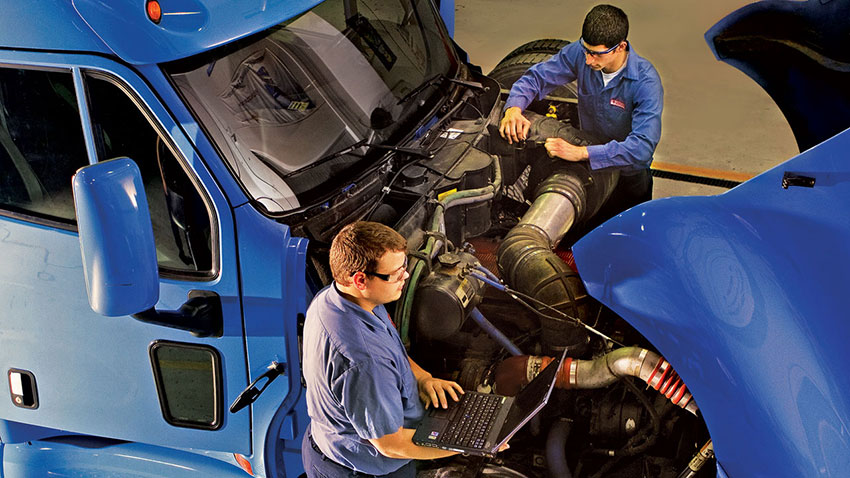In transportation and logistics, trucks are vital in moving goods across vast distances. To ensure their smooth operation, it is crucial to maintain the performance and efficiency of these powerful machines. One tool that has revolutionized the trucking industry is truck diagnostics. Truck owners and operators can effectively monitor, analyze, and optimize their vehicles’ performance with advanced diagnostic systems and technologies. This blog post will delve into truck diagnostics and explore how it enhances efficiency and performance.
Understanding Truck Diagnostics:
Truck diagnostics refers to monitoring, analyzing, and diagnosing the performance and condition of trucks using advanced technological systems. It involves using specialized tools, software, and sensors to gather data from various components and procedures within the car. By analyzing this data, truck owners and operators can gain insights into the health of their vehicles, detect potential issues or malfunctions, and make informed decisions regarding maintenance and repairs. Engine diagnostic tools help identify existing problems and enable proactive measures to prevent future breakdowns, optimize fuel efficiency, and enhance overall performance. It is a critical aspect of modern trucking operations, ensuring smooth and efficient transportation of goods across long distances.
Benefits of Truck Diagnostics:
Truck diagnostics offers a wide range of benefits for truck owners and operators, allowing them to maximize the efficiency and performance of their vehicles. Here are some key advantages of implementing truck diagnostics:
- Early Detection Of Issues: One of the primary benefits of truck diagnostics is detecting problems early. Advanced diagnostic systems can monitor various components and systems in real-time, capturing data and identifying potential problems before they escalate. By detecting issues early on, truck owners can address them promptly, preventing costly breakdowns and minimizing downtime.
- Preventive Maintenance: Truck diagnostics enables proactive maintenance rather than reactive repairs. By regularly monitoring the health of the truck, owners can establish a preventative maintenance schedule based on actual data rather than relying on guesswork or predetermined time intervals. This approach helps in optimizing the lifespan of the truck’s components, reducing the risk of unexpected failures, and improving overall reliability.
- Improved Fuel Efficiency: Fuel costs constitute a significant portion of operating expenses in the trucking industry. Truck diagnostics and computer diagnostic software can provide valuable insights into fuel consumption patterns and identify potential areas for optimization. By monitoring engine performance, aerodynamics, tire pressure, and other factors, operators can make necessary adjustments to enhance fuel efficiency, thereby reducing costs and minimizing environmental impact.
- Enhanced Performance And Longevity: Truck diagnostics play a crucial role in optimizing the performance and longevity of trucks. By monitoring critical parameters such as engine performance, transmission, braking systems, and emissions, operators can ensure that the vehicle operates within optimal parameters. This improves performance and helps extend the lifespan of expensive components, reducing the need for premature replacements.
Key Features of Truck Diagnostic Systems:
Truck diagnostic systems encompass a range of features and functionalities that enable comprehensive monitoring, analysis, and optimization of truck performance. Here are some key features commonly found in truck diagnostic systems:
- Real-time monitoring: Truck repair software provide real-time monitoring of various parameters and components. This includes monitoring engine performance, transmission, fuel consumption, emissions, braking systems, and other critical aspects. Real-time tracking gives operators up-to-date information about the truck’s condition. Enabling them to identify anomalies or deviations from normal operating parameters.
- Fault code analysis: When an issue or malfunction occurs in a truck, diagnostic systems. Generate fault codes that indicate the nature and location of the problem. Truck diagnostic systems can analyze these fault codes and provide detailed information about the issue. This helps in accurate and efficient troubleshooting, saving time and resources in identifying and resolving problems.
- Performance optimization: Truck diagnostic systems offer tools and functionalities to optimize truck performance. They can analyze data from multiple sensors and techniques to identify areas where performance can be improved. This may include adjustments to engine parameters, fine-tuning of transmission settings, optimizing fuel injection timing, or optimizing aerodynamics. Truck owners can improve efficiency, power, and overall performance by fine-tuning performance.
- Data logging and analysis: Truck diagnostic systems often include data logging capabilities. Which allow for the collection and storage of data over time. This historical data can be analyzed to identify trends, patterns, and potential issues that may take time to be apparent. By analyzing the data, operators can gain valuable insights into the truck’s performance and make data-driven maintenance, repairs, and optimization decisions.
- Integration with other systems: Many truck diagnostic systems are designed to integrate with other telematics and fleet management systems. This integration allows for seamless data exchange between different systems. Providing a holistic view of the truck’s performance and enabling efficient fleet management. It allows fleet managers to access diagnostic information, track maintenance schedules, and generate reports, all from a centralized platform.
Future Trends and Innovations in Truck Diagnostics:
The future of truck diagnostics is poised for exciting advancements driven by emerging technologies. Integration of Internet of Things (IoT) devices will enable real-time monitoring of truck components, allowing for continuous data collection and analysis. Additionally, autonomous diagnostics, where diagnostic systems can independently identify and resolve issues, will revolutionize the industry. As these innovations unfold, businesses like B & S Truck Diagnostics in Fort Worth will continue to offer cutting-edge services, leveraging these advancements to provide comprehensive and efficient diagnostic solutions to truck owners and operators.
You may also like
-
Automatic Fruit Wine Bottling Line for Small Wineries: A Complete Guide
-
How Does Plywood HSN Code Decide the GST Rate for Traders and Manufacturers?
-
POS Terminal Type: Which Is Best for Your Business?
-
How to Choose Fixed and Portable Gas Monitors for Industrial Gas Detection?
-
Simplifying Trademark Registration in Hong Kong: What Businesses Need to Know

